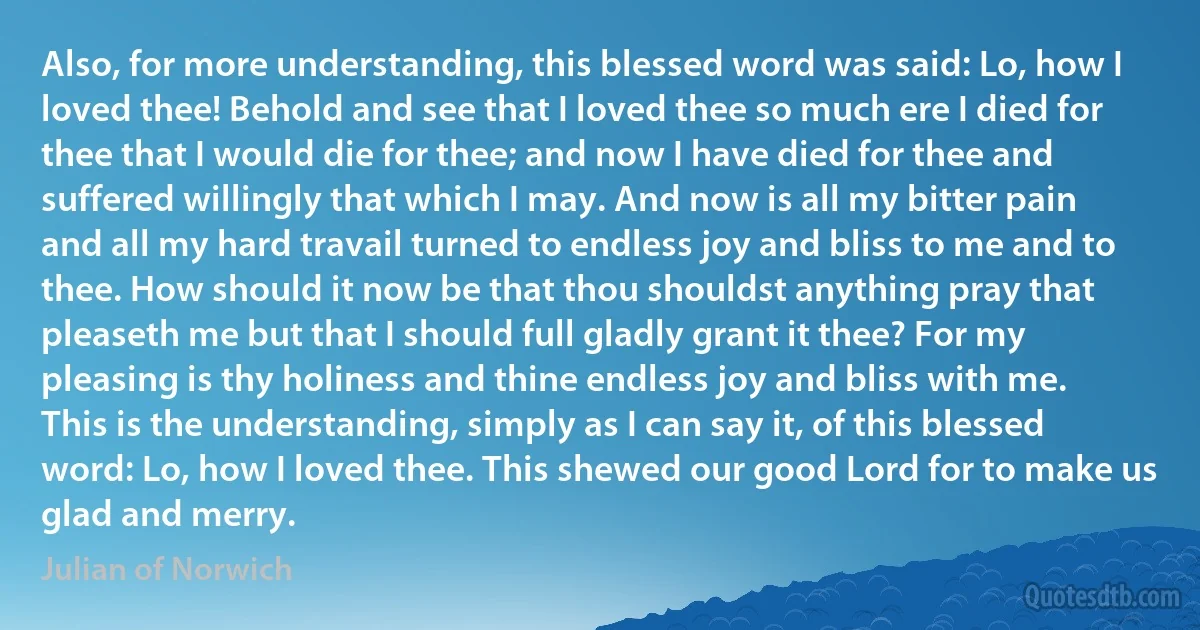
Also, for more understanding, this blessed word was said: Lo, how I loved thee! Behold and see that I loved thee so much ere I died for thee that I would die for thee; and now I have died for thee and suffered willingly that which I may. And now is all my bitter pain and all my hard travail turned to endless joy and bliss to me and to thee. How should it now be that thou shouldst anything pray that pleaseth me but that I should full gladly grant it thee? For my pleasing is thy holiness and thine endless joy and bliss with me. This is the understanding, simply as I can say it, of this blessed word: Lo, how I loved thee. This shewed our good Lord for to make us glad and merry.
Julian of NorwichRelated topics
anything bitter die ere full glad good grant hard joy lord merry now pain pleasing say see should thee thou travail understanding wordRelated quotes
Three points make me hardy to ask it. The first is, because it is so low a thing: for if it were an high thing I should be a-dread. The second is, that it is so common: for if it were special and privy, also I should be a-dread. The third is, that it needeth me to know it (as methinketh) if I shall live here for knowing of good and evil, whereby I may, by reason and grace, the more dispart them asunder, and love goodness and hate evil, as Holy Church teacheth. I cried inwardly, with all my might seeking unto God for help, saying thus: Ah! Lord Jesus, King of bliss, how shall I be eased? Who shall teach me and tell me that me needeth to know, if I may not at this time see it in Thee?

Julian of Norwich
Another understanding is this, that there be deeds evil done in our sight, and so great harms taken, that it seemeth to us that it were impossible that ever it should come to good end. And upon this we look, sorrowing and mourning therefor, so that we cannot resign us unto the blissful beholding of God as we should do. And the cause of this is that the use of our reason is now so blind, so low, and so simple, that we cannot know that high marvellous Wisdom, the Might and the Goodness of the blissful Trinity. And thus signifieth He when He saith: THOU SHALT SEE THYSELF if all manner of things shall be well. As if He said: Take now heed faithfully and trustingly, and at the last end thou shalt verily see it in fulness of joy.

Julian of Norwich
God has permitted and does permit us to be shaken by adversity. Difficult times lie ahead. We will be greatly tested. We have to take this warning seriously and live spiritually... Many saints would have loved to have lived in our times and have had our chance to struggle for Christ... Our struggle matters because it is not a struggle against an Ali Pasha, or a Hitler and a Mussolini, but a struggle against the devil himself. For this reason, our wages will be heavenly... The saints will become more holy and the vile will become more vile. Yet I feel great consolation inside. This is only a storm; like past storms, it will pass. May the Good God take evil and turn it into good. Amen.

Paisios of Mount Athos
Do everything simply and meekly. Do nothing with an ulterior motive. Don't say, I'll do this in order to have that result, but do it naturally, without taking cognizance of it. That is, pray simply and don't think about what God will bestow on your soul. Don't make any calculations. You know, of course, what God bestows when you enter into communion with Him, but it is as if you don't know. Don't discuss the matter even with yourself. So when you repeat the prayer, "Lord Jesus Christ, have mercy on me”, say it simply and ingenuously and think of nothing other than the prayer. These are very delicate matters and the intervention of the grace of God is required.

Porphyrios of Kafsokalyvia
Now I behold as in a mirror, in an icon, in a riddle, life eternal, for that is naught other than that blessed regard wherewith Thou never ceasest most lovingly to behold me, yea, even the secret places of my soul. With Thee, to behold is to give life; 'tis unceasingly to impart sweetest love of Thee; 'tis to inflame me to love of Thee by love's imparting, and to feed me by inflaming, and by feeding to kindle my yearning, and by kindling to make me drink of gladness, and by drinking to infuse in me a fountain of life, and by infusing to make it increase and endure. 'Tis to cause me to share Thine immortality.... For it is the absolute maximum of every rational desire, than which a greater cannot be.

Nicholas of Cusa
